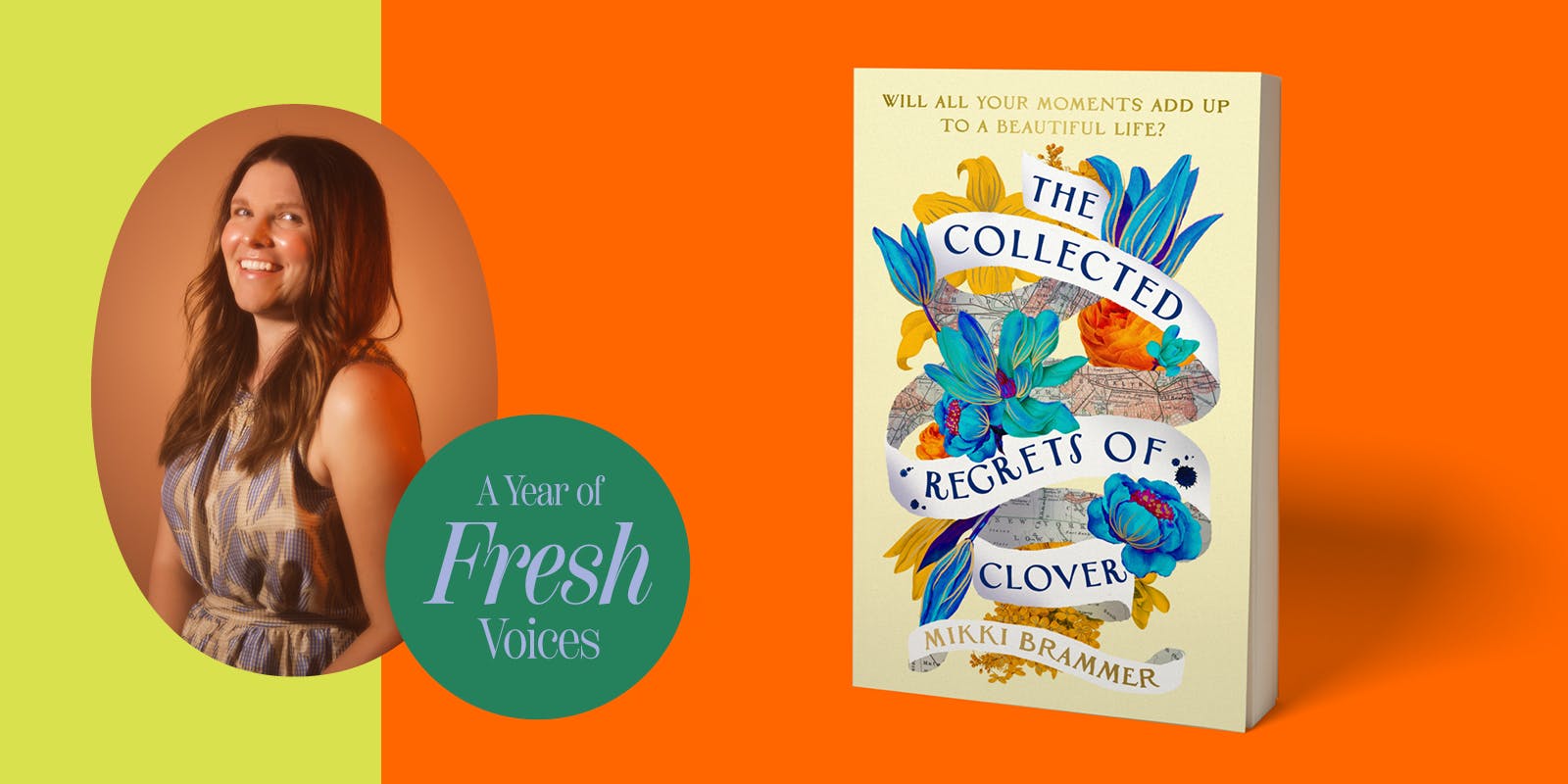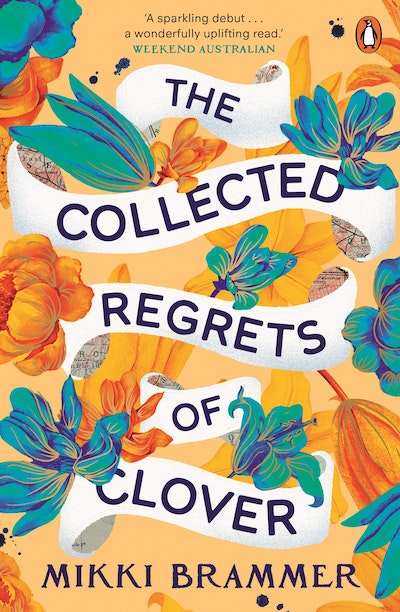Mikki Brammer shares details about ‘The Collected Regrets of Clover’ including where she got the idea and why chose to write about death.
What was your writing process like for The Collected Regrets of Clover? Did you have a writing routine or any regular rituals?
I‘m not really a fan of routine and usually, I like to write in many different places — in cafes, on trains, in libraries, in hotel lobbies, and parks. But since I wrote most of the book during lockdown, I had to find ways to create that variety in my small Brooklyn apartment!
I constantly switched between my couch, desk, and dining table (which I also used to play ping-pong against the wall during writing breaks). And I tried to set myself a writing goal for the day and then tackle it in chunks, rewarding myself at the end of each session (with a cup of tea, some reading time, or a game of solo ping-pong). Since I wasn’t really leaving the house, I wrote it a lot more quickly than I probably would have otherwise!
How did you first come up with the idea for the book?
Ever since I was a kid, I’d always felt anxiety around the topic of death, and a lot of that was because nobody ever really discussed it and it felt like such a taboo topic in Western society. But I’ve always been someone who does the things I fear most in order to conquer them, so I decided to immerse myself in it.
I started reading books, attending ‘death cafés,’ seminars and workshops, listening to podcasts and trying to be as curious as possible about the topic instead of avoiding it like I always had in my life before that. When I first learned about the concept of a death doula, I was fascinated that someone would dedicate their entire life to watching people die. It seemed like such a noble thing to do — to commit yourself to never looking away from anyone’s pain, no matter how harrowing it was. I found that so incredibly moving and I wanted to explore what would compel someone to choose that path in life, and what the role required of them both professionally and personally. And that’s how the character of Clover came about.
I then started thinking about how I could write a novel that presented death and grief in a way that was joyful and uplifting, and that would make those topics more palatable for people like me who feared them. My goal was to use Clover’s coming-of-age journey as a kind of Trojan Horse so that people would get so caught up in the story that they would be more receptive to the questions of mortality, grief and regret that are woven into the narrative without necessarily being conscious of it. And I wanted to do that in a way that was optimistic and fun, rather than depressing and confronting. At the very least, I hope that readers come away inspired to do the things they’ve always wanted to do before it’s too late.
What was your big break into publishing?
When I signed with my US agent, Michelle Brower at Trellis Literary Management. I knew my book idea was quite offbeat and some agents I queried weren’t confident that they could sell a book about death. But Michelle really saw — and believed in — what I was trying to do with it and was excited to help me execute that vision and bring Clover to life.
How long have you been working on this book?
The idea had been rolling around in my head for a couple of years, but because I’d never written fiction before (I’m a magazine journalist), I hadn’t done much on it. I finally sat down and wrote the book at the beginning of the pandemic, during lockdown in New York City (where I live) in April 2020. Since all my family was back in Australia and I was unable to return due to border closures, and most of my friends had also left the city, I had a lot of time to myself!
It was quite a strange time to be writing about death — there were constant sirens all day and all night, and I saw some of my neighbours stretchered out into ambulances never to return home. I think during that time there were several hundreds of people dying every day in the city from Covid. I remember riding my bike through the empty city, passing the morgue trucks outside the hospital, and knowing how many of those people likely died alone. That real-time awareness of death while I was writing was both confronting and inspiring.
What was the publishing process like (finding an agent, submitting manuscripts, etc.)?
When I was looking at agents to query, a few people mentioned Michelle’s name to me. I watched a webinar she had done with one of her other authors and loved her approach — she seemed like someone who would always have my back but who was also willing to tell me the truth and not coddle me, which is what I was looking for. (I know some authors like to be shielded from certain aspects of the process, but I prefer to know what I’m dealing with.)
I cold-queried her via email and was very fortunate that she saw potential in the rough manuscript I had sent, which, in retrospect, could have used several more edits before I queried it! We then worked together to develop the story and make the narrative tighter and find Clover’s voice before we went out on submission to editors. The manuscript ended up going to auction in the US with offers from five different imprints, and Michelle and the Trellis team also connected me with my UK agent, Jemima Forrester at David Higham Associates, as well as many great foreign agents, which led to the rights to my book being sold in 19 territories (and hopefully counting!). I hadn’t considered the fact that my book would be published in different languages, so to have it sell in so many countries long before its publishing date was quite unexpected and thrilling.
What most excites you about your book being published in 2023?
Honestly, it would be exciting to have a book published any year! But, given what we’ve all been through in the past few years, what is most exciting about it being published now is the thought that it could help make the topics of death, grief, mortality, and regret more easily talked about in Western society. I think the pandemic has meant that most of us have been touched by a loss or grief in the past few years, but in many cases don’t know how to process it. It would be wonderful if my book could help make those conversations easier and less taboo in our society since we’re all going to have to have them sooner or later.
Do you have a favourite book or author?
That always seems to change depending on the mood I’m in, but three books that I read and loved recently were Intimacies by Katie Kitamura, You Exist Too Much by Zaina Arafat, and Little Rabbit by Alyssa Songsiridej. Some books that particularly influenced me when writing The Collected Regrets of Clover include A Single Man by Christopher Isherwood, Eleanor Oliphant is Completely Fine by Gail Honeyman, Convenience Store Woman by Sayaka Murata, Bonjour Tristesse by Françoise Sagan, The Safety of Objects by A.M. Holmes, Anxious People by Fredrik Backman, and Matilda by Roald Dahl.
What inspired you to become a writer?
What better thing could there be than to live in your imagination all day long? I feel so fortunate to have been able to make writing my profession, first as a journalist and now as an author. To me, writing is the opportunity to reflect the world back to people in a way that I hope helps them see its magic and beauty and also perhaps understand themselves better. Books and stories have always done that for me, and so I cherish the fact that I now have the chance to do that for other people.
What did you want to be when you grew up and why?
So many things! An artist, a librarian, a detective, an actor, a photographer, a couple’s therapist, a linguist, a musician ... To this day, I never think of myself as having just one occupation. I’ve always been very curious and love learning new things and I have many different things going on in addition to writing fiction. I write about art, architecture and design for magazines, do photography, play musical instruments, learn languages, and study psychology—and I’m sure there’s more to come!
If you could go back in time and give your past self one piece of advice, what would it be and why?
I don’t believe in changing things in the past because I think our journeys as young people — including the challenges, mistakes, and regrets — are what shape us as adults and gift us the wisdom we wouldn’t have otherwise. That said, one of the characters in my book gives Clover the advice to be “cautiously reckless,” which I love. It’s actually a piece of wisdom that Jane Birkin gave me when I interviewed her years ago for an Australian magazine, and I’ve tried to live by it ever since. To me, it’s about taking calculated risks, trusting that things will work out as they’re meant to, and accepting that life always has its challenges. And that it would be very boring if it didn’t!
What is the best writing lesson/tip you ever received?
Write with your heart, not with your head. And embrace the messiness of a first draft without going back and editing it. There will be plenty of time for that later, so just let things flow in whatever form they happen to appear, without overthinking them.













